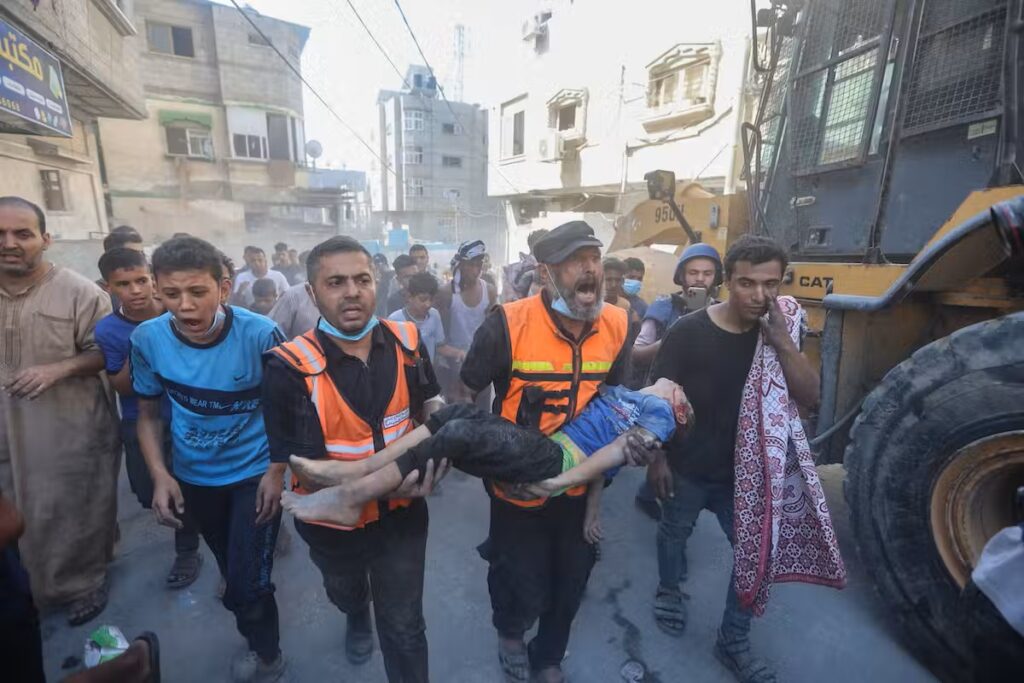Aid Workers In War Zones Like Gaza May Face Traumatising Choices
Dec 11, 2023 | Pratirodh Bureau
Palestinians carry a dead boy following Israeli strikes on Gaza on Oct. 26, 2023 (Ahmed Zakot/SOPA Images/LightRocket via Getty Images)
The shaky pause in fighting agreed between Hamas and Israel is bringing much needed relief to the civilians of Gaza. With its future still uncertain, aid workers are rushing to deliver food, water and other vital supplies. However, it is clear that resources are insufficient to meet the current needs of Palestinian civilians.
As a result, aid workers have to make difficult decisions and are feeling helpless in the face of immense necessity. Because of the moral challenges that aid workers in Gaza and all over the world face, they are at great risk of moral injury.
Moral injury is a form of psychological trauma that occurs after events that are so incompatible with our moral values that they have the power to shatter our deeply held assumptions about justice, about one’s ability to be a moral being and about what is good or right.
Morally Challenging Events Weigh Heavily On Aid Workers
Aid workers consistently face a host of moral challenges. Colleagues and I recently conducted a study on the psychological effect of moral challenges. We interviewed 243 aid workers about their work, morally distressing events they may have experienced and their mental health. Most were working in Africa, the Middle East and Asia.
We found that 81 per cent of aid workers have experienced events that are traumatic because they violated core moral beliefs. Some events had to do with aid workers’ own actions. For example, aid workers struggled to decide how to allocate and use insufficient resources like food, medicine.
Similarly, another study found that medical staff had a deep sense of unease in having to choose which seriously ill patients to treat (and which ones not to treat) because of limited resources. Aid workers have to deal with these kinds of lose-lose decisions that have no possible good outcome.
Other times, aid workers may have done something they believed right, only to find out that their decisions had unintended negative consequences. For instance, deciding to distribute food to women and children first, resulting in a series of assaults on them.
Our research also shows that aid workers were often frequently disturbed by events that they witnessed. Aid workers may struggle to understand the actions of others in survival situations or witness the inhumane treatment of other human beings. They may have difficulty not to intervene in the face of violence or injustice.
Other morally challenging events involve aid workers feeling that they have been betrayed. For example, aid workers could have a deep sense of betrayal when they feel that their organization or a leader have failed to sufficiently protect them. Around 27 per cent of aid workers reported at least one disturbing event that left them feeling betrayed.
Aid Workers Left Traumatized
People experience moral injury in many different ways. We know from research on veterans that most report very strong emotions of anger, disgust, shame or guilt.
They often experience symptoms of depression, anxiety and post-traumatic stress disorder (PTSD). They may withdraw from loved ones or self-sabotage. Those affected by moral injury often have negative thoughts about themselves. For example, they may feel weak or have suicidal thoughts. They may feel that they are broken or that their life has lost meaning.
Morally challenging events appear to be an important risk factor for aid workers. Our research suggests that many may suffer from moral injury. Such events were significantly associated with more symptoms of PTSD and depression. In fact, morally challenging events contributed more strongly to symptoms of PTSD and depression than events where their safety was compromised.
Coping With Moral Injury
Aid workers operate in complex and often chaotic environments. They are very resilient, but the nature of their work inevitably involves moral challenges and, thus, risks of moral injury. Nonetheless, there are some steps that individuals and organizations can take to alleviate moral injury.
First, establishing procedures to help aid workers make difficult decisions could help reduce the personal burden of aid workers. For instance, research on other high-risk occupations suggests that making decisions as a team, fostering team cohesiveness, and routinely discussing moral struggles could better protect people from moral injury.
Second, discussing moral injury as an occupational risk of aid work is important to make this hazard better known. Aid organizations should recognize that their workers might question the morality of some events, and may have difficulty understanding their own actions, the actions of others and events that are perceived as betrayals. This is essential to reduce stigmatization and validate the experiences of aid workers.
Third, shame, disgust, anger and guilt are signs of healthy moral functioning and should not be taken as objective signs of wrongdoing. Reconnecting back to an individual’s values and to why they got into this line of work can be a good place to start unpacking those feelings.
Lastly, psychological vulnerability and strength in the aftermath of trauma often go hand in hand. We found evidence that morally challenging events can lead to psychological growth for aid workers.
These distressing events may lead aid workers to revisit their life objectives, to develop a new understanding of what is important in their lives, to develop a stronger sense of personal strength, to feel that their social relations are more intimate or meaningful, and to have a greater appreciation of life.
This kind of self-care can meaningfully help aid workers as they deal with the moral challenges they encounter. The current situation in Gaza shows just how important aid workers are to civilians in crisis. Research on the psychological well-being of aid workers is important to better support them in this role and in the work that they do.
(This article is republished from The Conversation under a Creative Commons license. Read the original article here)
